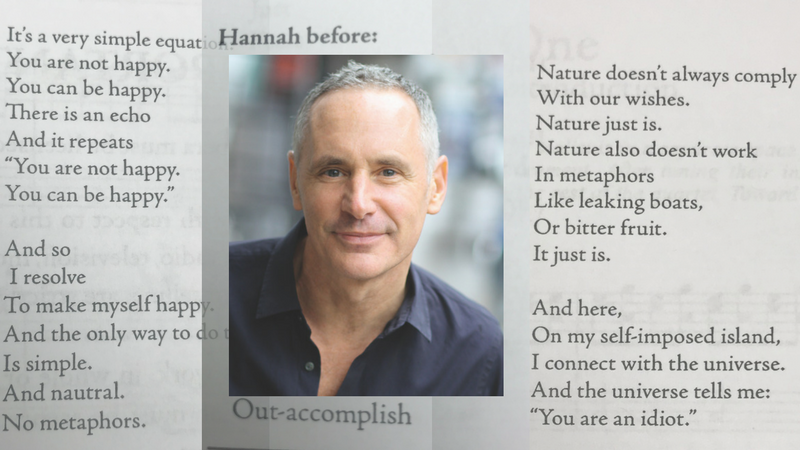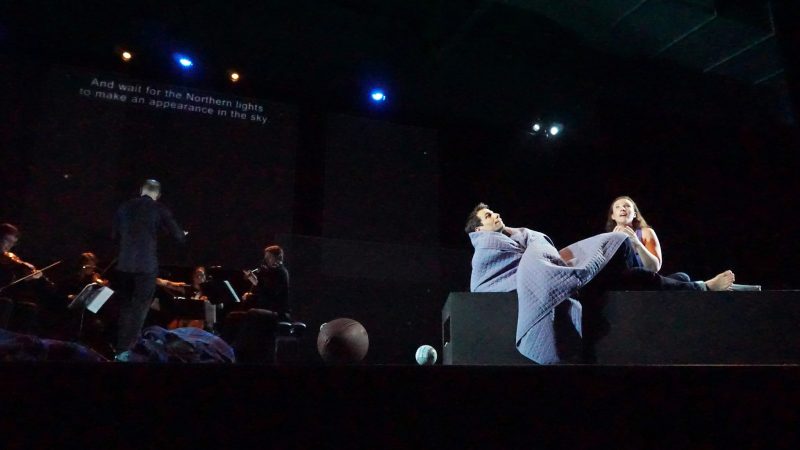An opera all starts with a story. And that story all starts with a libretto — an opera’s text. One person who has made this specific form of story-telling his career is Pulitzer Prize award-winning librettist Mark Campbell.
Mark Campbell’s work is at the forefront of the current contemporary opera scene in America. He’s also one of the co-librettists of HOT’s next production As One, opening this weekend on January 11, 2018. Together with composer Laura Kaminsky and filmmaker Kimberly Reed, Mark Campbell co-created the opera, which depicts with empathy and humor the journey of a transgender person. HOT’s production of the 75-minute chamber opera is the 13th production of the work since it premiered in 2014, making it one of the most produced new operas in recent history.
In this month’s #HOTSpeaks, we hear the unique perspective of what it’s like to be, as Mark Campbell puts it, the ‘guardian of the story.’
What made you decide to become a librettist?
I really love the combination of music and text and the power that it can give to a story. It can produce a more profound and urgent experience with an audience and helps them empathize with characters, stories and situations in a way plain text cannot. I got into writing librettos mostly because I love music.
Many decades ago, I was an actor — and not a very good one. A composer I knew was writing a musical about the last days of the Romanovs that had an imminent workshop on the horizon and asked me to contribute some lyrics. I discovered I really loved it. Following that, I wrote a few musicals and won a couple of prestigious awards in musical theater. Steve Sondheim honored me the first Kleban Foundation Award for Lyrics, which to this day remains the only award for lyricists and librettists in musical theater. But my first real foray into opera came in 2001, when John Musto asked me to create an opera with him for Wolf Trap Opera. The resultant Volpone, adapted from Ben Jonson’s play, was a big hit. And I felt I had found my artistic home.
What is it like being a librettist in the 21st century?
It’s incredible. A lot of people are identifying our current scene in opera as “The Golden Age of American Opera.” I don’t know if that’s really true, and we’ll probably only know that decades from now, but it’s a terrific time to be a librettist, and I’m especially pleased how my colleagues and I are raising the profile of libretto-writing with operas that are more story-centric. Opera isn’t just about hitting high notes any more, or enduring some pretty silly librettos.
It’s about giving the audience a story that they are entertained by, that they can relate to, and even see mirrored in their own lives. And I think As One fits into that description very nicely.
What kind of skills do you need to become a librettist?
A librettist today needs to be a good storyteller, a mutable collaborator, a fine craftsman and understand almost intuitively how words work with music. I feel very fortunate in that I studied the lyricist’s craft rigorously for many years, which has served me well in writing opera librettos. In fact, As One can be characterized as a theatrical song cycle more than as a traditional song cycle.
Has working as an actor also influenced the way you write librettos?
Yes, in that I aim to create characters and roles for performers that are complete and specific, with traditional theatrical elements like arcs and motivations. I feel that a lot of bad opera happens these days because librettists create archetypes, not defined characters.
While writing a libretto, what kind of relationship do you try to maintain with the composer?
I’ve worked with more than 35 composers in my career and written the librettos for 25 operas. I’ve worked a lot with “first-timers” and with three Pulitzer Prize-winning composers. Every single composer and every single experience has been different—even with composers whom I’ve collaborated more than once. Some composers will set 95% of the first draft of the libretto I give them, others 25%. But every time I collaborate with composers, I know that part of my job is making sure that I give them a story and text that inspires them to composer their best music.
One thing a lot of people don’t know is that the libretto always comes first. Many people still have the silly notion that the composer writes the music and the libretto merely comes in a fills in some words. My first drafts of librettos are rigorously structured and always work within the format of identifying those traditional operatic moments, like arias and ensembles. Why work in opera if you don’t take advantage of the form?
What themes are you most interested in drawing out in your librettos?
I had six premieres in 2017. One was a sophisticated 1930s comic opera called Dinner at Eight. One was about the commissioning of the Rothko Chapel in Houston, with the theme of making art. Another was an opera about the life of Steve Jobs. And the other two were about serial killers… So I can’t seem to identify a consistent theme —nor can anyone else. But I will say that I am a fan of Hitchcock and love stories with suspense, surprise, and distinctly theatrical elements.
When people ask me what stories make a good opera, I always answer, rather glibly, ‘stories that sing.’ Opera is a musical art form. If the story is better spoken, then let it be spoken.
What was it like writing about a transgender protagonist in As One?
It was one of the most gratifying experiences in my career, mostly because of my collaboration with Kimberly Reed. Neither Kim nor composer Laura Kaminsky had written an opera before and didn’t really understand at the time that an opera springs from the story. After meeting them, I went home and sketched a story in three parts in which a transgender person becomes her authentic self — based very loosely on some of Kim’s experiences. I asked Kim to write the libretto with me, because the story would be inauthentic if I wrote it alone. But in working with Kim, I also discovered what a fantastic storyteller she is. So the libretto wasn’t just about a message, but a real person.
How have people reacted to the opera and its story?
Wherever we play, Laura, Kim and I make sure that we connect with the LGBTQ+ community, and specifically, the transgender community. When Kim and I created the story of As One and the story of its protagonist, Hannah, we decided early on that it must be told with humor and in such a way that the audience can see themselves in her arc of discovery. I really think that the universality at the core of the story has been one factor that has greatly contributed to the opera’s success. Another is the ease in which it can be performed. There are no castles or choruses to contend with, just two performers playing one role and the simplest of production values.
Over the past few years, is there any one moment that has been most fulfilling in working with the team of creators for As One or in seeing it produced?
Seattle Opera invited transgender youth from age eight to 18 to a dress rehearsal performance of As One. Many came with guardians, because many of these young people had been tragically kicked out of their homes by their parents. Following the performance, Laura and I had the honor of speaking to them about the opera and it was gratifying to hear them tell us how much they appreciated that we had captured their story. Also, about a month ago, Des Moines Metro Opera had five transgender people participate in a post-performance panel. For a number of audience members in attendance that night, it was their first time seeing or meeting a transgender person. I hope many people who see As One realize that the differences between their journeys as human beings and Hannah’s are very similar. And that this opera merely raises visibility.
What are your plans for the future? Any new works in progress?
Kim, Laura and I are working together again on an opera called Today It Rains, which is being produced by San Francisco’s Opera Parallèle and American Opera Projects. It’s an opera imagined from a real event in the life of Georgia O’Keeffe—when she boarded a train in New York in 1929 and arrived in Santa Fe a few days later, transformed.
I also have an oratorio premiering at Carnegie Hall in May, with music by Paul Moravec, who I wrote The Shining with. The work is based on the writings of William Still, conductor for the Underground Railroad. Called Sanctuary Road, it will be performed by the Oratorio Society of New York.
Additionally, I’m creating another work with Paola Prestini for Minnesota Opera based on the young adult novel, The Miraculous Journey of Edward Tulane. And another opera I wrote with Kevin Puts and Elizabeth Cree —Silent Night and—has several productions this year. Lastly, The (R)evolution of Steve Jobs, which was the most successful opera in Santa Fe Opera’s history, is going to San Francisco Opera, Seattle Opera, Indiana University, and probably many more companies. There’s a lot going on, but not as many premieres as last year. And I’m frankly a little grateful for that!


